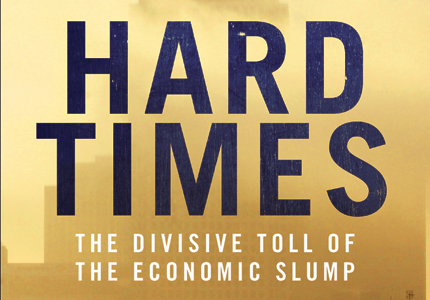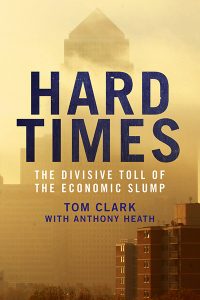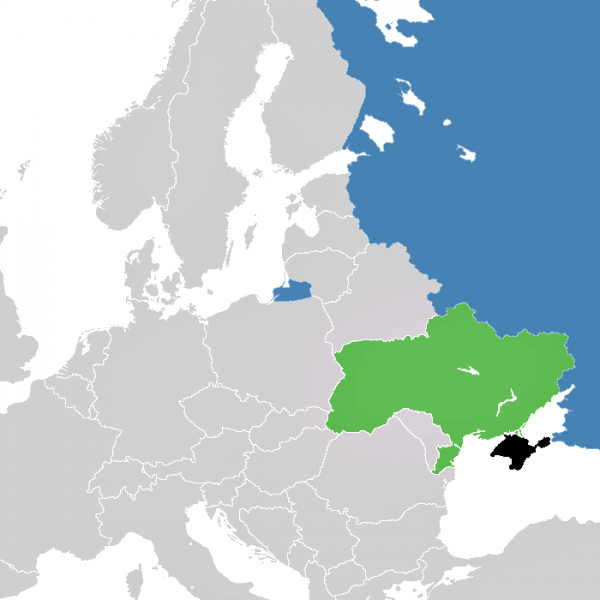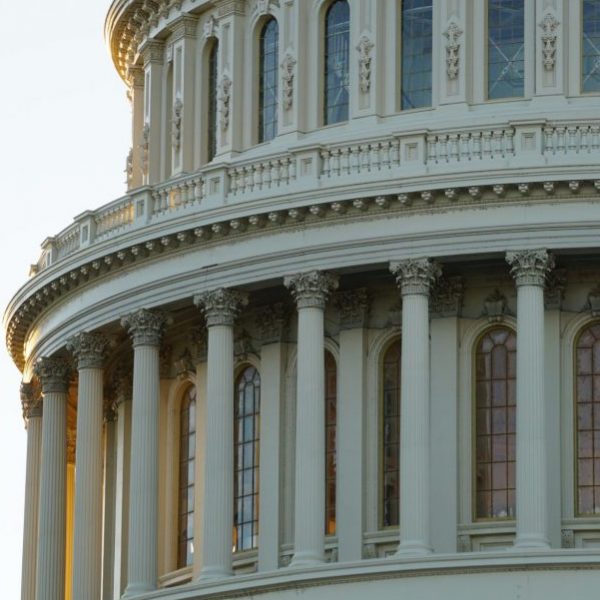How Our Economic Hard Times are Breeding Social Anxiety
Exploring “Where is the Money?” in the current economic crisis also begs the question “what is the human cost of the financial slump?” Acclaimed journalist Tom Clark investigates this question with “the most rigorous accumulation of evidence to date,” as declared by The Guardian, in Hard Times: The Divisive Toll of the Economic Slump with sociologist Anthony Heath. In an informative and interactive blog post, shared below, Yale Press’s London Blog and Clark explain the uneven impact of economic crisis and its effect on the social order and behavior. You can also read Salon‘s Q&A with Clark about his new book Hard Times, or read a sample chapter on ISSUU.
The current economic crisis, like the Great Depression of the 1930s, has caused not just financial misery for the millions of people it affected. A raft of social problems, declining civil engagement, raising suicide rates and increasing inequality have all taken a toll on already struggling populations. Even more troubling, the poorest and most vulnerable sections of society are often disproportionality impacted. This ‘social catastophe’ is the subject of Hard Times, the latest book by acclaimed Guardian jouranlist Tom Clark.
In this interactive infographic, produced for Yale by Kiln, Hard Times author Tom Clark illustrates how the economic crisis has done lasting damage to the fabric of society and how austerity measures are exacerbating an already disturbing state of affairs.
Interactive infographic by Kiln
After the financial implosion of 2008, the world sank into the deepest recession since the 1930s. Hard Times asks what this has done to two rich but vastly unequal societies: Britain and the United States. Exploiting an array of data and striking interviews with those affected, Tom Clark documents how misadventures in the towers of high finance cascaded down to the streets below. Everything from PTA membership to sales of playing cards dived during the Great Depression; this compelling book traces the Great Recession’s path through our own times, uncovering a drop in life satisfaction, frayed community connections and changing patterns of suicide. In every case, the toll is greater in poor neighbourhoods, due not only to unemployment, but also to the precarious, unreliable jobs proliferating in the recovery. As austerity redoubles the hardship, this book’s new analysis suggests scarring that will blight individual and family life for years to come. Over a third of a century, the gap between rich and poor has steadily widened; with the crisis, this economic divide has deepened into a societal schism. Public opinion has polarised in parallel, poisoning politics, and leaving the victims of recession divided and powerless. In more prosperous neighbourhoods the slump might soon be forgotten, but this urgent, authoritative book pulls the scales of complacency from our eyes. It cannot be missed by anyone who yearns for a healthier, happier and less divided tomorrow.




























Very glib little analysis, neatly quantifying oppression. It’s a well known consequence that the oppressed take their feelings of powerlessness out on those even less empowered than themselves, probably in imitation of their masters(Paolo Friere). If the study were a little more in depth, other social factors like domestic violence levels, child abuse, sexual physical and psychological, public violence like rape, assaults and juvenile delinquency would provide a more detailed image of social decay and ‘atomisation’. The consequence of less social cohesion is likewise well known where those in the same social stratum become rivals, competing for the same meager resources, thus leading to isolation of individual workers and increasing their vulnerability to exploitative labour practices, like loss of benefits and job security in the form of part-time hiring practices, e.g. Walmarting .
While the study points to the source of the problem, as Pikkety pointed out, excessive profit taking by corporates and the super wealthy and lower returns for the rest of us, it neglects to specifically identitify the economisation of our consciousnesses where the rational of economic efficiency justify dehumanising practices neglecting broader social fallout. One can go on and on about this but it may be worth looking at societies that have resisted this trend, like that of France. Unless policy makers wake up to the need for everybody to benefit and unless workers realise the need to organize we can see our lives turned to hell. “a hungry man is an angry man”
We can call it Social Depression. Given the social welfare programs, people rode the economic depression but it took toll on their mind and relationships.
Huge change in social values over past 30 years and a prolonged state of feeling ‘not well’ are good ingredients for further deterioration of social fabric.